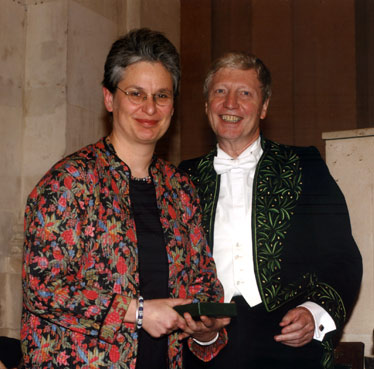Catherine Dulac with Jules Hoffmann, President of the Académie des sciences, Institut de France
Catherine Dulac of MCB and the Howard Hughes Medical Institute has been awarded the prestigious Richard Lounsbery Award for 2006. According to the National Academy of Sciences, the award “is given in alternate years to young American and French scientists in recognition of extraordinary scientific achievement in biology and medicine.” Granted under the joint auspices of the NAS and its French counterpart, Académie des sciences, Intitut de France, the prize is intended both to stimulate research and encourage scientific exchange between France and the United States.
Prof. Dulac expressed delight at her selection: “I feel really honored… The Lounsbery award has a very special significance to me because it is not only a great honor and a recognition of the work in my laboratory, but also because it is meant to strengthen the scientific relationships between France and the US. This pleases me enormously, and fits particularly well with my dual French-American scientific belonging.” Further, she comments, “I am just back from giving a series of conferences and scientific visits in France which were part of the award, and I was able to forge new links with research teams across the ocean, which is very exciting.” Prof. Dulac is the first MCB faculty member to receive the Lounsbery Award as a French scientist. Doug Melton was a recipient in 1995 and Tom Maniatis shared the prize in 1985 with Martin Gellert.
Prof. Dulac was recognized for “major contributions in the perception and behavioral translation of pheromones in mammals.” The Académie des sciences announcement notes her pioneering work in pheromones, chemical signals implicated in several basic behaviors and sexual responses in particular. It adds: “Dulac has recently discovered an ionic channel TRP2 that, when rendered non-functional by genetic manipulation, eliminates male-male aggressive behavior [in mice]. Thus, TRP2 is a ‘behavioral gene’; its function demonstrates that the role of the [pheromone-sensing] vomero-nasal organ is critical in recognition of the gender of congeners, and that in the absence of its functioning, the default behavior is to reproduce indiscriminately with either sex.” Dulac’s research has been widely recognized as path-breaking; she was elected to the American Academy of Arts and Sciences in 2004.
The Lounsbery Award was created by Vera Lounsbery in memory of her husband Richard, for work in biology and medicine in the service of humanity. In addition to a $50,000 prize, as 2006 Lounsbery awardee, Prof. Dulac is granted funds for transatlantic collaboration and is invited to lecture on her work during the sessions of the French Académie for the next three years.




